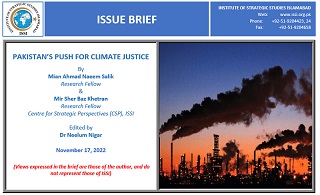Background
Pakistan has long been considered one of the most vulnerable countries to climate change in the world. While Pakistan is one of the lowest contributors to climate change, it is one of the most impacted countries in the world. Extensive rains, which pummelled Pakistan in the late summer of 2022, inundated the country, putting a third of it under water. More than 33 million people have been affected by the flooding, brought on by record monsoon rains amplified by climate change with an estimated $30 billion in damages incurred. This was after the country had gone through an extreme heat wave in the earlier part of the summer making Pakistan one of the most susceptible countries to climate induced calamities.[1]
According to data released by the Ministry of Climate Change (MOCC), during the last two decades the country has experienced 152 extreme events, triggered by climate change, of which the recent catastrophic floods are one. There has been a 300% increase in glacial lake outburst flood (GLOF) in one year alone. Furthermore, the high intensity heatwave persistence has increased to 41 days per year and Pakistan has had the hottest cities in the world for 3 straight years now. The statistics released by the ministry also show that the country is likely to hit absolute water scarcity by 2025. Apart from a lack of water, food insecurity is also expected to rise from 40% to 60% by 2050.[2]















